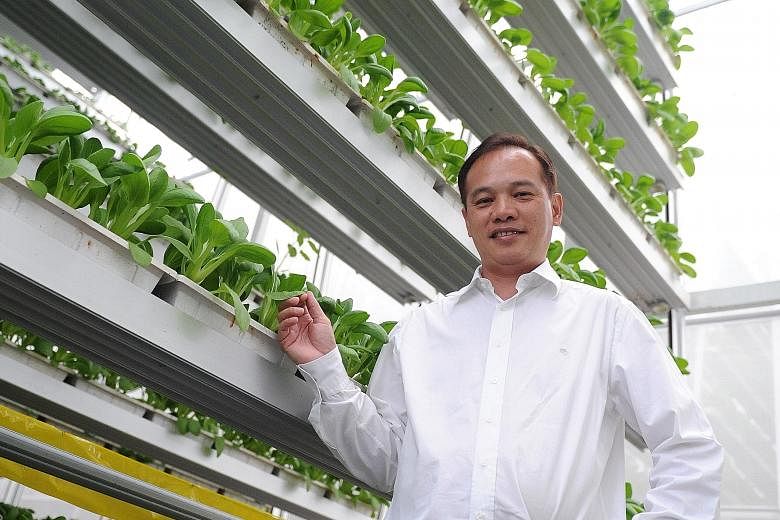Q: What does your business do?
A: Our 3.65ha farm here in Lim Chu Kang is a research and production facility. We approach research in two ways: as a solutions provider through our vertical farming system, and by conducting research on the crops.
We constantly look at our processes and the input materials for the plants because the nutrients that the plants take in will have an impact on their taste.
We also provide our vertical farming towers and know-how to overseas clients, such as a farm in Hainan, China, which acquired 192 towers from us.
Q:Who do you supply your vegetables to in Singapore?
A: We started supplying vegetables to supermarket chain FairPrice in 2012. We supply about five types of vegetables to FairPrice. They include the popular nai bai or milk cabbage, spinach, chye sim, kangkung and lettuce.
Q:Where did the idea for the company come from?
A: About seven years ago, I was in the construction and engineering industry and ran my own business out of a factory in Kallang.
I had many foreign workers then - from India, China and Bangladesh. Many of them used to be farmers in their own countries.
I found out that they were homesick. I thought perhaps I could help them. We had an unused backyard behind my factory and I decided to let the workers, including local office staff, use the space for planting.
That brought the workers together - they shared what they grew and gave each other tips.
After that, I began to experiment with vertical planting - three layers at first, in my home garden and the factory backyard.
Q:How does it feel moving from engineering and construction to the agriculture business?
A: To me, it is not very different. Previously, I built houses for people to live in, now I build "houses" for plants. They key difference is that it is probably less stressful to deal with plants.
Q:What makes you stand out from your competitor?
A: Our biggest advantage is cost efficiency. Many vertical farms are indoors, which means they need to use a lot of energy for LED lighting for the plants, ventilating the area and controlling the humidity level. The running cost to do these is high.
For example, indoor farms in Japan use 20 kilowatt to 25 kilowatt of energy to produce 1 kg of vegetables.
Here, we use 0.3kw, because we make use of natural light, and we use the pump that pumps water to the plants to drive our rotating vertical farming towers.
It's hydraulic action, and we don't have to use additional energy. All these will translate to savings for the consumers.
Due to the simple but efficient design, our system is comparatively cheaper to construct than most vertical farming concepts in the market.
Q:How do you intend to grow your operations in Singapore in the next 12 months?
A: We have 1,000 vertical farming towers now, and we are building more. At full capacity of nearly 2,000 vertical farming towers next year, we will be able to produce five tonnes to 10 tonnes of vegetables a day, depending on the varieties we grow.
Q:What are your plans on growing the business overseas?
A: We have a lot of inquiries from city farms in the United States, Russia, France and even the Middle East. We are in negotiations with many potential clients.
Of course, China will remain a key market for us because of its size. We are also planning to fabricate our vertical farming system there as it cuts cost by up to 50 per cent for very large-scale projects.
Another initiative we are working on is the Sky Urban SG100 Agripolis. We shared the proposal with the National Development Ministry recently. When our partners in Iskandar Malaysia and China heard about this, they were very keen too.
So we may develop it overseas, if it does not take off here.
Q:What is Sky Urban SG100 Agripolis?
A: It is a vision to unlock the agricultural potential of urban spaces, especially in land-scarce Singapore.
Our idea is to build an integrated hub, an agripolis, on 20ha of land. It will feature a high-tech plant research facility and large vertical farming zones, which can potentially produce 30,000 tonnes of leafy vegetables a year.
There will also be separate zones to house egg production and fisheries, as well as recycling facilities and support services such as food processing and packaging.
Q:What is your advice for anyone who is looking to start their own business?
A: Don't worry, just do it. If I had thought everything needed to be perfect before I started out, I won't be here today. There will always be problems, just solve them as they come.

